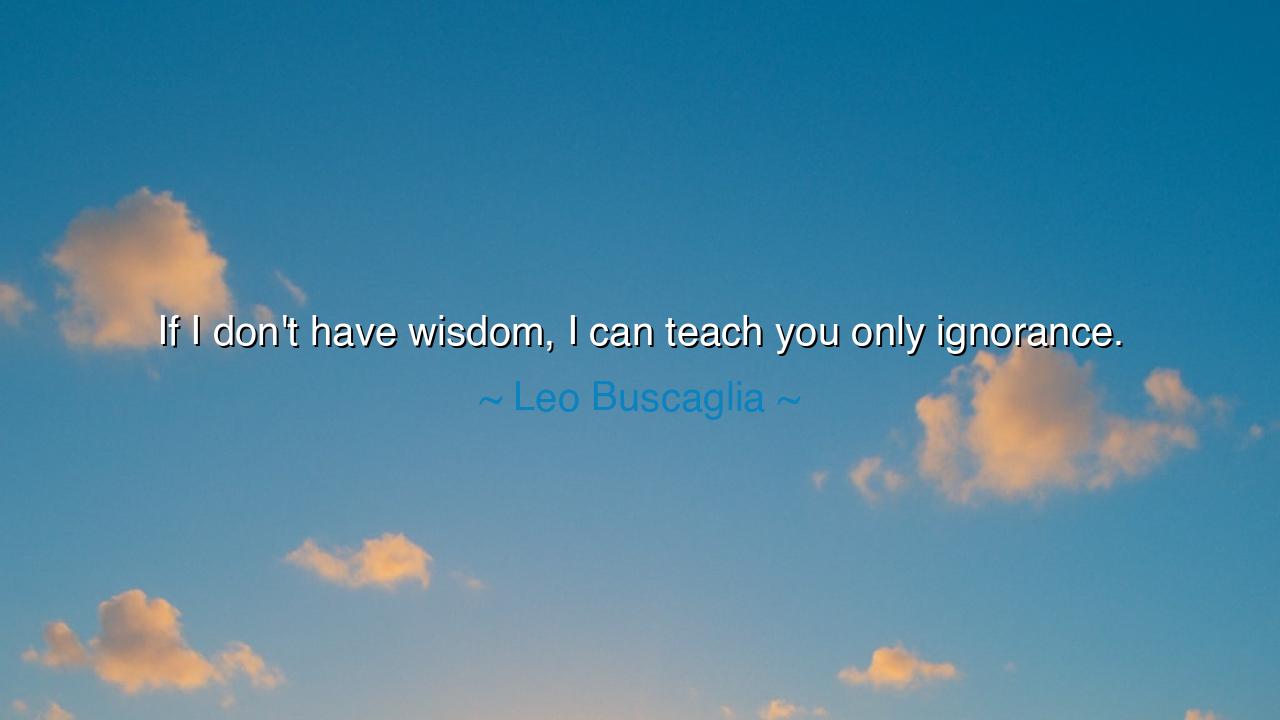
If I don't have wisdom, I can teach you only ignorance.






Wisdom is the light by which the torch of learning is passed from one soul to another. When Leo Buscaglia, the great teacher of love and life, declared, “If I don't have wisdom, I can teach you only ignorance,” he revealed a profound and humbling truth: that a teacher can only give what they themselves possess. If the vessel is empty, it cannot pour water into the cups of others. If the heart and mind of the guide are clouded, their students will inherit that same darkness. True teaching begins not with words, but with the inner substance of the teacher’s spirit.
At the heart of this teaching lies the sacred responsibility of mentorship and leadership. To teach is not merely to recite facts or perform duties. It is to shape the minds and souls of others. If a teacher lacks wisdom—if they have not sought understanding through reflection, humility, and experience—they will unknowingly spread ignorance, planting seeds of falsehood or confusion in those who trust them. This is why the ancients held teachers, philosophers, and leaders to such a high standard, for the future of the community rests upon their integrity.
History offers a striking example in the life of Socrates, the philosopher of Athens. Socrates did not claim to know all things; rather, he declared, “I know that I know nothing.” This humility was the beginning of his wisdom. By constantly questioning and seeking truth, he became a beacon for his students, including Plato, who would carry his teachings forward for generations. Socrates understood that to guide others, one must first be guided by the relentless pursuit of wisdom. His legacy shows that self-knowledge is the foundation of true teaching.
Conversely, when leaders lack wisdom, their ignorance spreads like a plague. Consider the collapse of certain medieval kingdoms where rulers, blind with arrogance and superstition, refused to learn or listen. Their poor decisions led entire nations into famine, war, and despair. The people suffered because those at the top taught not through truth, but through error and folly. This reflects Buscaglia’s warning: when the one who holds power or authority is ignorant, they cannot uplift others—they can only drag them deeper into darkness.
Buscaglia’s words also speak to the personal journey of every individual. Whether we are teachers, parents, friends, or leaders, we are always imparting something to those around us. Our actions, words, and attitudes become lessons, even if unspoken. Thus, the first step to teaching well is to seek wisdom within ourselves—to read, to reflect, to question, and to grow. In this way, what we share with others will be rich, life-giving, and true.
Let this lesson echo through the halls of time: a teacher’s soul is their greatest textbook. As Leo Buscaglia reminds us, we cannot lead others to light if we ourselves dwell in shadow. Strive to become wise not for your own sake alone, but for all those who will learn from your example. For when wisdom fills the heart, every word and deed becomes a gift, shaping generations yet to come with truth and love.






AAdministratorAdministrator
Welcome, honored guests. Please leave a comment, we will respond soon